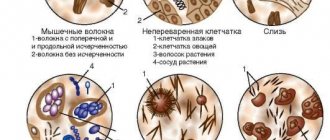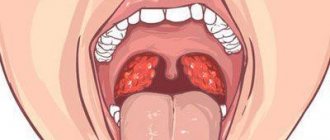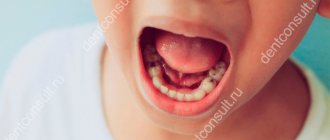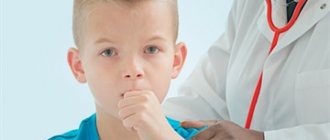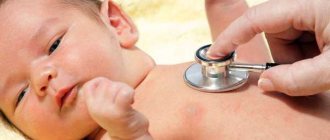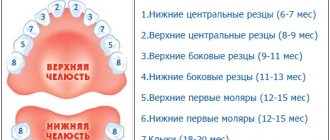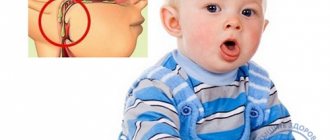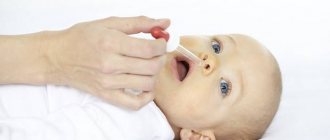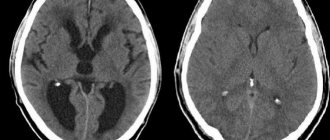Food poisoning in a child is not such a rare occurrence, this is due to the fact that children often put things into their mouths that they should not, and in addition, their body is weaker than that of an adult and is more susceptible to damage by harmful bacteria. It is important to maintain proper nutrition in children. In order to avoid any complications, every parent should know how to provide first aid when a child is diagnosed with a toxic infection, and how to proceed further.
Features of toxic infection in children
Food poisoning is the ingestion of harmful bacteria contained in spoiled foods of plant, animal and chemical origin.
The process of development of poisoning can be divided into three stages:
Latency is the period that passes from the moment harmful bacteria enter the body until they begin to penetrate the walls of the stomach and intestines, thereby causing the first symptoms of food poisoning. This stage is the most favorable to provide first aid and try to prevent the development of the disease.
Toxigenic - the stage when the symptoms of poisoning begin to manifest themselves in full. When they are first detected, it is immediately necessary to provide the necessary treatment, in the form of gastric lavage, cleansing enemas, medication, and a special diet. If the stage of poisoning has gone too far, then in this case it is necessary to contact a medical institution for help.
Recovery - after ridding the body of harmful substances, it needs time to recover from the shock it has experienced.
Causes of childhood food poisoning
In order to avoid the appearance of symptoms and treatment of poisoning in a child, you must first know in what ways you can get sick:
- Eating food products that have expired or are subject to improper storage. In them, especially in dairy products, harmful organisms begin to develop, which cause poisoning.
- Eating foods that have not undergone the necessary processing, for example, meat or fish.
- Eating mushrooms, plants or berries that are unsuitable for food.
- Accidental ingestion of any chemical substances into the body with food.
Signs of food poisoning
Symptoms of poisoning in a child appear within a few hours after consuming the forbidden product:
- First of all, restlessness begins in the digestive system, which after poisoning provokes frequent diarrhea or vomiting; there are cases of their simultaneous appearance. The stool may be mixed with mucus.
- Painful sensations are felt in the abdomen, especially in the stomach area.
- The general state of health worsens, body temperature rises, weakness, drowsiness, and loss of appetite appear.
- If vomiting and diarrhea occur frequently, dehydration may occur, which is expressed by sharper facial features and dry skin. In addition, convulsions may occur. You can read about what to do if a child is vomiting in the article: Vomiting in a child: reasons, how to stop, review of medications.
Depending on the type and degree of poisoning, the duration of the symptoms depends, which may pass in a couple of days, or may develop serious health complications, including death.
First aid for poisoning
What to do if your child shows symptoms of food poisoning? First of all, call a pediatrician. If the doctor is not able to examine the child in the next few hours (late evening or weekend), you need to call an ambulance. In case of mild poisoning, they will not be hospitalized, but they will be able to prescribe adequate treatment.
Before the doctor arrives, the child needs to be given a sorbent. In case of vomiting, to avoid a bad reaction, the drug is diluted in water and given to the child in small portions every 5-10 minutes.
You can do gastric lavage, but only if the child is over 6 years old. You need to take warm water 10 ml/kg body weight and dissolve 2-3 crystals of potassium permanganate in it. After the solution has cooled, the child needs to drink it completely, followed by vomiting and cleansing of the stomach. This method is effective if symptoms appear 30-60 minutes after consuming the toxin and it is still in the stomach.
You can cleanse the intestines with an enema. It is necessary to take an age-specific dose of sorbent (activated carbon, Smecta), dissolve it in water and give a cool enema. Its volume depends on the age of the patient:
- 1-2 years - 70 ml;
- 2-3 years - 140 ml;
- 3-4 years - 200 ml;
- over 4 years 250-300 ml.
In case of poisoning, the child must fast for the first 24 hours. This is very difficult for mom, but you need to remember that if you put stress on your stomach, all the acute symptoms will return. In addition, it is advisable that the baby observe bed rest.
First aid
What to do if a child is poisoned at home, immediately after it is detected:
- First, you need to provide constant drinking in order to avoid dehydration in case of poisoning. This should be clean, boiled water at room temperature. Children over 5 years old can be given decoctions of chamomile, rose hips or tea.
- Next, you need to give sorbents, this can be activated carbon, which absorbs harmful substances and calmly removes them from the body. However, taking sorbents is prohibited if there is gastric bleeding or intestinal obstruction.
- It is also necessary to carefully monitor your diet during this period. On the first day, it is better to refrain from eating. The next day, you can start giving crackers, porridge with water, light broths, teas, medicinal decoctions or plain water. It is better to stick to this diet for several days, carefully returning to the previous one, excluding, accordingly, foods that can cause poisoning.
It should be remembered that during the treatment of poisoning, it is better not to resort to those medications and products that can harden the stool. It is better if all harmful substances leave the body naturally, because this is why the protective function in the form of diarrhea or nausea is activated.
Medicines to treat food poisoning in children
To speed up the treatment process for food poisoning in children, you can take special medications.
Medicines
Currently, many medications have been created aimed at getting rid of the symptoms of poisoning, as well as restoring the body, which are also suitable for children, for example:
- Regidron - suitable for getting rid of diarrhea and vomiting, it is available in the form of a powder, which must be diluted in warm, clean water and given to the child with this solution throughout the day.
- Smecta is also available in powder form, which must be drunk several times a day for 3–7 days, depending on the severity of the poisoning.
- Lactofiltrum - available in tablets, restores intestinal health.
The main thing to remember is that any medicine has its contraindications for use and age restrictions, so before use you must carefully read the instructions, which also indicate the method of use and dosage.
Sorbents
Sorbents are medicines that are taken during the provision of surgical assistance, before the arrival of doctors or before the provision of basic treatment. They are able to absorb all harmful bacteria and remove them from the body.
Activated carbon is considered the most common and accessible sorbent. His tablet is capable of absorbing all toxins, subsequently increasing in size. The amount of activated carbon taken is always calculated as follows: 1 kg of the patient’s weight * 1 tablet. Read more about sorbents in the article: TOP 5 sorbents for children.
In addition to coal, there are a number of other sorbents, for example, Enterosgel - paste for oral administration, Sorbex, Atoxil. The main thing when purchasing medications is to also pay attention to the expiration date of the drug.
Probiotics
Probiotics are drugs that contain one or more beneficial bacteria, which, after entering the body, remain in it and begin to conduct useful life activities, fighting harmful organisms.
Probiotics include drugs such as acylact, lactobacterin, biobacton, probifor.
Antibiotics
Taking antibiotics when treating food poisoning in a child at home is excluded. Such medications can only be prescribed by the attending physician if the disease has reached a serious stage of complications, and after weighing the pros and cons, it was decided that the harm caused to the child’s body will be lower than the developing complications.
Drugs are prescribed based on the individual characteristics of the patient, this can be: ersefuril, phthalazole, cefix.
Video: methods of cleansing the body in case of poisoning
Read further:
How to restore intestinal microflora after poisoning: methods
What can pregnant women take for diarrhea?
Which mineral water to choose in case of poisoning ✅ with food or alcohol
How to take lactofiltrum correctly for acne, for weight loss, and for hangovers
Paracetamol poisoning in children and adults - symptoms and consequences
Article rating:
Share with friends:
You may also be interested in:
Bifidumbacterin
